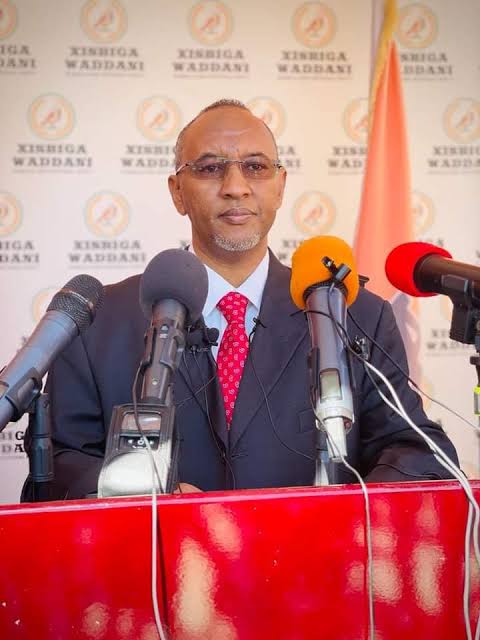Facebook Twitter (X) Instagram Somali Magazine - People's Magazine
Hirsi Ali Haji Hassan, chairman of Somaliland’s Waddani party, has firmly denied allegations of a secret meeting with Somali President Hassan Sheikh Mohamud during a recent visit to Djibouti, dismissing the claims as baseless and politically motivated. His response comes amid rising tensions and public outcry in Somaliland, where many citizens interpreted the rumors as a betrayal of the region’s ongoing quest for independence from Somalia.
Addressing the press in Mogadishu, Hirsi made it clear that his party remains committed to transparent political practices. “I did not meet with President Hassan Sheikh during my visit to Djibouti. If any discussions were to be held, they would align with our party’s policy and be conducted openly. We do not operate in secrecy,” he stated.
The allegations, however, sparked protests in Somaliland’s capital, Hargeisa, where demonstrators accused Hirsi of compromising the region’s sovereignty aspirations. Some critics argued that his visit to Djibouti, a nation with which Somaliland has experienced strained relations in recent months, was politically inappropriate. The tensions stem from diplomatic disagreements over maritime access and regional influence, further amplifying public skepticism about the nature of his trip.
Protesters questioned Hirsi’s authority to engage in diplomatic activities, arguing that such responsibilities fall under the jurisdiction of Somaliland’s Ministry of Foreign Affairs. “It’s not his place to act as a diplomat,” stated one demonstrator, emphasizing concerns that the Waddani leader was exceeding his political mandate as a party chairman.
The controversy has reignited debates about Somaliland’s ongoing negotiations with Somalia regarding its self-declared independence, a long-standing issue since Somaliland unilaterally broke away from Somalia in 1991. Despite declaring independence, Somaliland has not achieved international recognition, complicating its political and economic relationships on the global stage.
Hirsi Ali Haji Hassan has played a significant role in diplomatic engagements between Somaliland and Somalia in the past. During his tenure in former President Ahmed Silanyo’s administration, he was instrumental in initiating formal talks aimed at resolving the decades-long political deadlock. However, over a decade later, these negotiations have yielded limited results, leading many Somalilanders to question their effectiveness.
Critics argue that the continued discussions with Somalia have become a political distraction, preventing Somaliland from focusing on pressing domestic challenges such as economic development, education, and infrastructure improvement. The lack of substantial progress has fueled public frustration, with many citizens calling for a reassessment of the diplomatic approach.
Supporters of Hirsi, however, contend that dialogue remains crucial for peaceful conflict resolution and long-term stability in the Horn of Africa. They argue that maintaining open channels of communication with Somalia, even in unofficial settings, could facilitate gradual diplomatic progress and improve regional cooperation.
The latest controversy comes at a politically sensitive time for Somaliland, as the region prepares for upcoming elections. The Waddani party, under Hirsi’s leadership, has positioned itself as a key opposition force challenging the current administration. Allegations of secretive diplomacy, therefore, carry significant political implications, with opponents seeking to undermine his credibility ahead of the elections.
Pundits suggest that the protests and public backlash may reflect broader dissatisfaction with Somaliland’s political climate, including concerns over transparency, governance, and the slow pace of achieving full sovereignty. The situation underscores the complex interplay between domestic politics and regional diplomacy in a region where historical grievances and power struggles often intersect.
As the political landscape in Somaliland evolves, the incident involving Hirsi Ali Haji Hassan serves as a reminder of the delicate balance between political leadership, public trust, and the pursuit of diplomatic resolutions. Whether the Waddani leader’s denials will be enough to quell public anger remains uncertain, but the controversy has undoubtedly intensified the broader debate on Somaliland’s political future.

